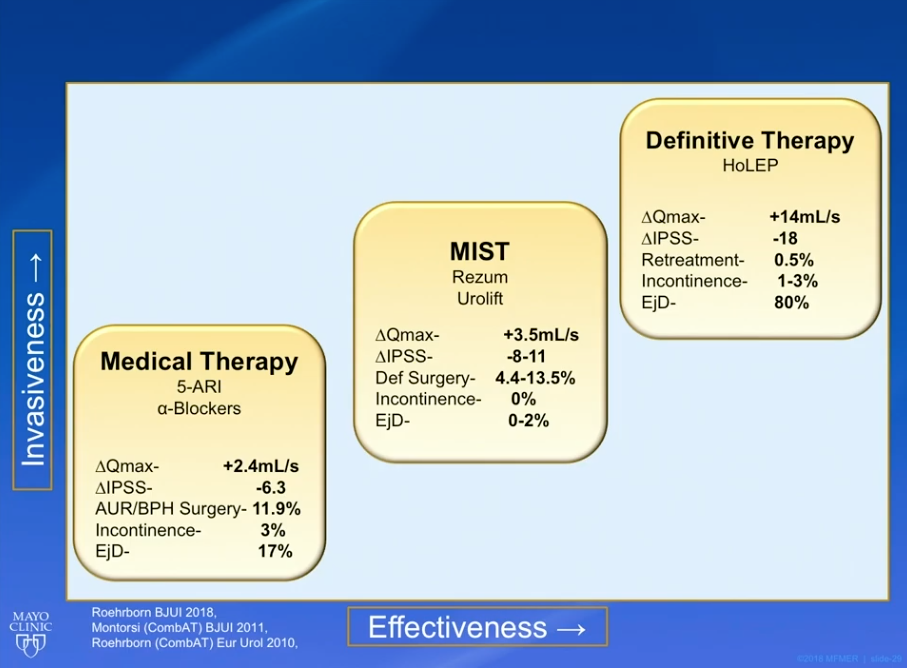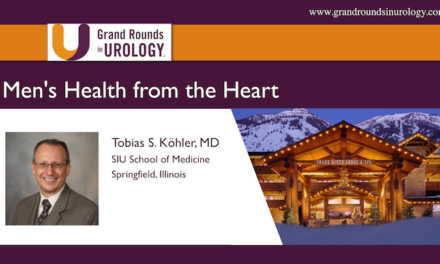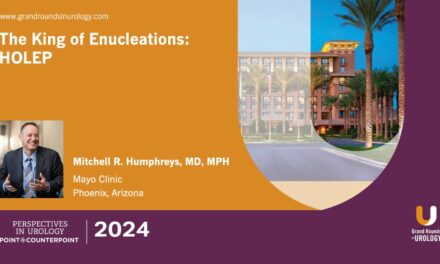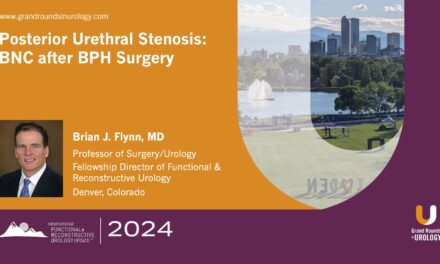Scott M. Cheney, MD presented “Treating BPH: Comparing HoLEP, Rezum, and Urolift” during the 27th Annual Perspectives in Urology: Point Counterpoint on November 9, 2018, in Scottsdale, Arizona.
How to cite: Cheney, Scott M. “Treating BPH: Comparing HoLEP, Rezum, and Urolift” November 9, 2018. Accessed Nov 2025. https://grandroundsinurology.com/treating-bph-comparing-holep-rezum-and-urolift/
Treating BPH: Comparing HoLEP, Rezum, and Urolift – Summary:
Scott M. Cheney, MD, reviews the background and practical application of minimally-invasive surgical therapies and definitive therapies for benign prostatic hyperplasia (BPH). He then discusses patient selection for these therapy options based on recommendations, level of evidence, and comparative outcomes.
Abstract:
BPH is incredibly prevalent, affecting 15 million men over the age of 30. There is a plethora of options for treating BPH, and observation and less aggressive therapies are generally first-line approaches. However, this presentation focuses on three other options: minimally-invasive procedures UroLift, or “Prostatic Urethral Lift (PUL)”, and Rezum, or “Water Vapor Thermal Therapy”; and the definitive therapy, Holmium Laser Enucleation of the Prostate (HoLEP).
According to American Urological Association (AUA) guidelines, UroLift is an optimal option for patients with prostate volumes over 80g and the absence of an obstructive middle lobe who are concerned with erectile and ejaculatory function. For patients with the same characteristics, but regardless of the presence of an obstructive middle lobe, clinicians may consider Rezum. However, efficacy and long-term retreatment evidence regarding this approach remains limited.
HoLEP is a suitable prostate-size independent option, and is standard of care for patients with a high risk of bleeding. Furthermore, efficacy, invasiveness, cost, and physician skill set should factor into decision-making.
Thirty one randomized trials have assessed HoLEP over the 20+ years of its availability. Conversely, UroLift and Rezum are relatively new techniques with limited levels of evidence. Overall, HoLEP shows greater durable improvements in International Prostate Symptom Score (IPSS), quality of life due to urinary function, and maximum urinary flow rate (Qmax) than the two minimally-invasive approaches. While UroLift and Rezum show little to no change in erectile or ejaculatory function from baseline, HoLEP has a significant risk of retrograde ejaculation. Complications and retreatment rates are higher in HoLEP than in UroLift and Rezum. However, this may not be an accurate comparison due to limited reporting on the minimally-invasive techniques.
This presentation also reviews special considerations for all three techniques and an algorithm for decision-making in BPH management.
About Perspectives in Urology: Point Counterpoint
Perspectives in Urology: Point Counterpoint (PCP) is an annual CME-accredited conference devoted to discussing and debating the latest topics in men’s health, general urology, and genitourinary cancers. The conference’s format includes more than didactic lectures. It also includes debates, point-counterpoint discussion panels, and unique case-based presentations. Dr. Cheney presented this lecture during the 27th PCP in 2018. Please visit this page in order to register for future PCP meetings.
ABOUT THE AUTHOR
Scott M. Cheney, MD, is a Senior Associate Consultant at Mayo, and is involved with teaching residents and fellows. He grew up in Phoenix, Arizona, and attended the University of Arizona, where he received his undergraduate degree in molecular and cellular biology. He also attended medical school at the University of Arizona and graduated in 2009. Following this, he received his urology training at the Mayo Clinic in Arizona, from which he graduated in 2014. Dr. Cheney’s clinical focus is treatment of benign prostate hyperplasia (BPH), kidney stones, and minimally invasive surgery for urological cancers and benign disease. He performs HoLEP, HoLAP, TURP, Rezum, laparoscopy, and robotic surgery of the kidney, ureter, bladder, and prostate. His research interests include BPH and prostate cancer. Other interests of his include global health, as he often travels to Haiti to participate in local clinics and teach urologists there.





